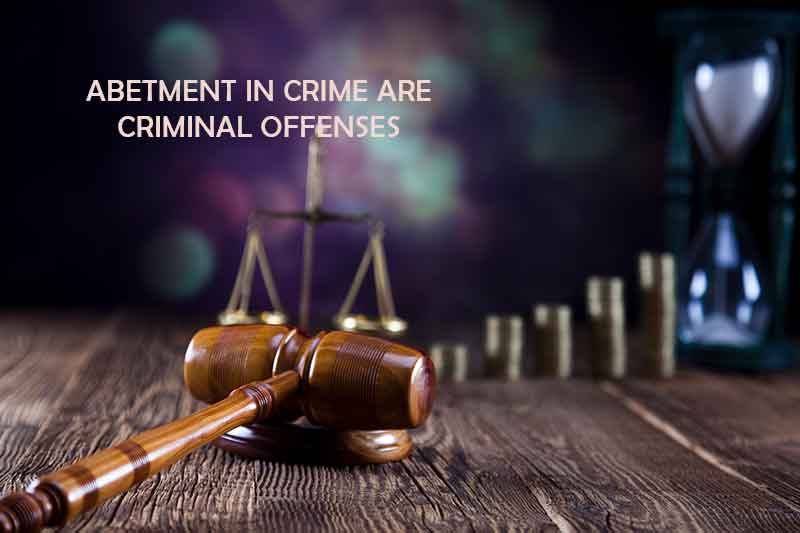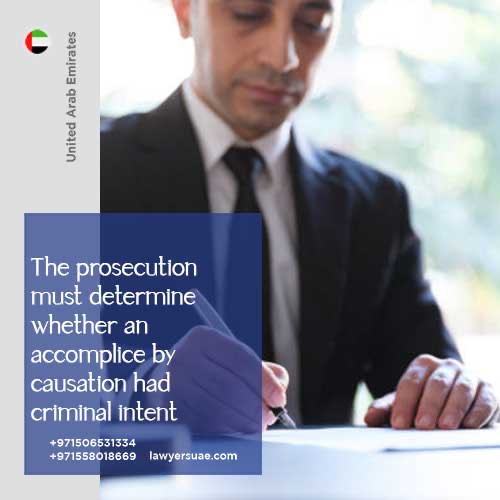Abetment refers to the intentional encouragement, incitement, aiding, or facilitation of the commission of a crime by another person. It is an inchoate offense, meaning the abettor can be held liable even if the abetted crime was never actually committed. In the United Arab Emirates (UAE), abetment is considered a severe offense with steep penalties.
There are three primary types of abetment: instigation, conspiracy, and intentional aiding.
This article aims to shed light on the elements, types, and real-world implications of abetment under the criminal law of UAE
Elements of Abetment
For an act to qualify as abetment, two key elements must be met:
- Actus Reus (The Guilty Act): This refers to the specific actions of instigation, engagement in conspiracy, or intentional aiding. Actus reus is the physical component of a crime, such as the act of encouraging someone to commit a robbery or providing them with the means to do so.
- Mens Rea (The Guilty Mind): The abettor must have the intention to provoke, aid, or facilitate the commission of a criminal offense. Mens rea refers to the mental element of a crime, such as the intention to help someone commit a criminal act.
Additionally, there is generally no requirement that the abetted crime actually be successfully carried out for liability under abetment law. The abettor can be prosecuted based solely on their intention and actions to promote the crime, even if the crime itself was never completed.
Types or Forms of Abetment
There are three primary ways the crime of abetment can occur:
1. Instigation
Defined as directly or indirectly urging, provoking, encouraging, or soliciting someone else to commit a crime. This can occur through words, gestures, or other means of communication. Instigation requires active involvement and criminal intent. For example, if someone repeatedly tells their friend to rob a bank and provides detailed plans on how to do it, they could be guilty of instigating the crime, even if the friend never follows through with the robbery.
2. Conspiracy
An agreement between two or more people to commit a crime. Often considered the most serious form of abetment, conspiracy requires merely the agreement, regardless of any further steps or actions taken. A conspiracy can exist even if the individuals never actually carry out the planned crime.
3. Intentional Aiding
Providing assistance or resources like weapons, transportation, advice that intentionally aids in a criminal act. Intentional aiding requires active complicity and intention. Liability applies even if the abettor is not physically present at the crime scene. For instance, if someone knowingly lends their car to a friend to use in a planned robbery, they could be guilty of intentionally aiding the crime.
Abetment vs. The Actual Crime
It is important to distinguish between an abettor and the principal offender who directly commits the criminal act:
- Abettors are considered accessories to the crime, while the principal offender is the primary perpetrator who directly carries out the criminal act.
- Both abettors and principals can face criminal punishment & penalties. However, abettors generally receive lighter sentences compared to the principal offenders who directly committed the crime.
- Proving a causal link (proximate cause) between the abettor’s actions and the subsequent crime is key for establishing liability. Prosecutors must show that the abettor’s encouragement or assistance directly contributed to the commission of the crime.
Punishment for Abetment
The severity of punishment for abetment varies based on the circumstances of the case:
- If the abetted offense is actually committed, the abettor faces equal punishment as the principal offender who directly carried out the crime. For example, if the abettor helped plan a murder and the murder was successfully carried out, the abettor could face the same punishment as the individual who committed the murder.
- If the crime was attempted but not completed, punishment varies depending on the gravity of the offense. Common sentences include:
- Fines
- Up to 10 years in prison
- The death penalty as punishment is applied in certain extreme cases of abetment.
Defenses Against Abetment Charges
While abetment is considered a serious offense, several legal defenses exist that an experienced criminal defense attorney may employ:
- Lack of required intention or knowledge: If the abettor did not intend to aid or encourage the crime, or was unaware of the criminal nature of the actions, this could provide a defense.
- Withdrawal from the criminal conspiracy: If the abettor withdrew from the conspiracy before the crime was committed and took steps to prevent its occurrence, this could negate liability.
- Claiming duress or coercion: If the abettor was forced to aid or encourage the crime under threat of harm or violence, this could serve as a defense.
- Demonstrating failed proximate cause between actions and crime: If the abettor’s actions did not directly contribute to the commission of the crime, this could weaken the prosecution’s case for establishing liability.
Understanding potential strategies and using case law precedents are key for building an effective defense against abetment charges.
Real-World Examples of Abetment
- Providing inside information that assists in planning a terrorist attack
- Encouraging someone over social media to commit violence against a specific group or individual
- Creating and distributing “how-to” guides for manufacturing illegal explosive devices
- Helping hide a wanted fugitive from law enforcement by providing shelter or transportation
- Purchasing hacking tools or software for someone with the intention of aiding them in committing cybercrime
These examples demonstrate the broad scope and real-world applicability of abetment laws in the UAE.
Conclusion
The crime of abetment should not be taken lightly in the UAE. Encouraging, inciting, or aiding in any criminal act carries steep penalties, even if the crime itself was never successfully carried out. A strong understanding of the specific elements, types of abetment, punishment statutes, and potential legal defenses is essential for all UAE citizens to avoid entanglement with these complex laws. Consulting an experienced criminal defense lawyer early on can mean the difference between serving years in prison or avoiding prosecution entirely.
If you have been investigated, arrested, or charged with a criminal offense related to abetment in the UAE, it is crucial to seek legal counsel immediately. A knowledgeable attorney can guide you through the legal process, protect your rights, and ensure the best possible outcome for your case. Do not attempt to navigate the complexities of abetment laws on your own – retain legal representation as soon as possible.
Your legal consultation with us will help us to understand your situation and concerns. Contact us to schedule a meeting. Call us now for an Urgent Appointment and Meeting at +971506531334 +971558018669







